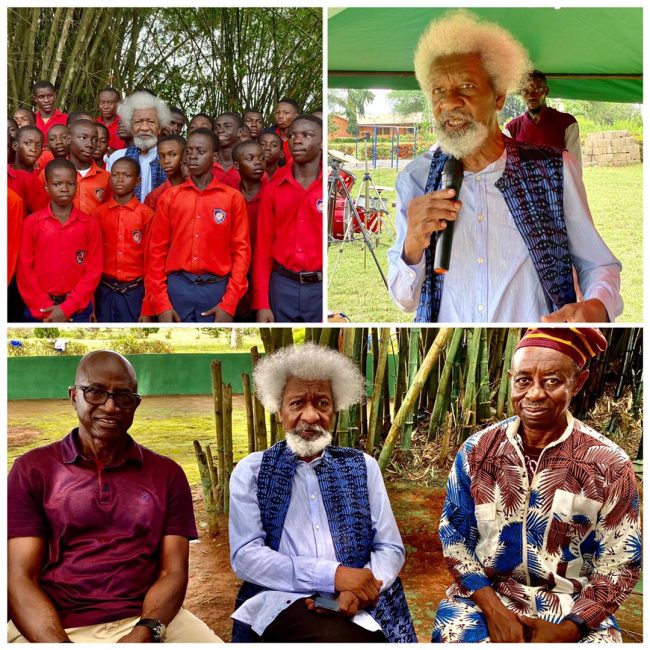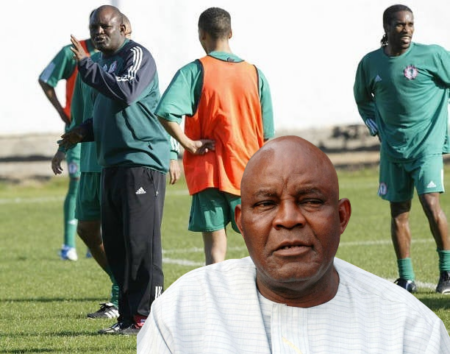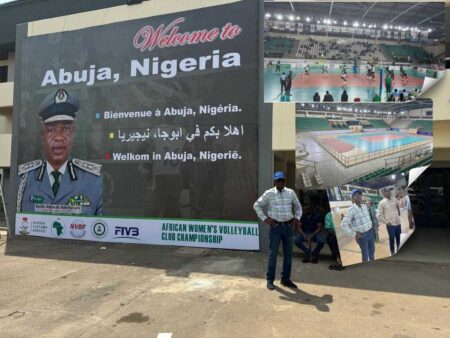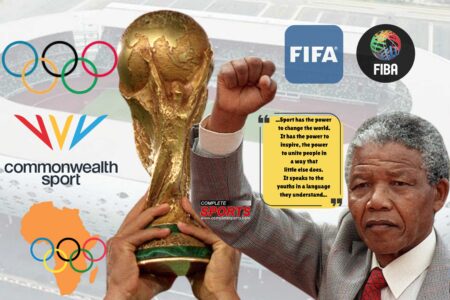The late sage, Dr. Tai Solarin, confessed in his article that I re-published last week, that Samuel Ogbemudia, the first governor of former Mid West State, would have summarily sacked him as head of any school in the State because of his “negative attitude towards games and sports” . In his opinion students wasted their time in athletics and football pursuits instead of expending their physical energies for “more production of physical facilities for education and food”.
He was to learn later that the work ethics of Ogbemudia as well as the unprecedented development of the Mid West State were achieved through the instrumentality of sport and its inherent values.
Professor Wole Soyinka, the first citizen of the Autonomous Republic of Ijegba, teacher, writer and social activist, Nobel Laureate and one of the most respected Nigerians alive, would not even have been employed by Ogbemudia in those days, to start with.
Like Tai Solarin, sport is not one of his known favourite interests or pastimes. Kongi discussed in his books, plays, speeches and numerous lectures almost every subject under the sun, with the exception of sport.
Why does Kongi not take any liking to the most followed and most passionate activity in the world – sport?
I have the strong feeling that he does not consider athletics and football of substantial benefit to Nigeria, a country beset with too many other complex problems, the least of which is sport. He may even have thought of sport as a national distraction, another one of Nigeria’s numerous and avoidable problems. He would ordinarily think that sport and scholarship belong in the same planet. Thats my feeling. 8
Some years ago, I was part of an audience at a book-fair event held in the main hall of the June 12 Cultural Centre, Kuto, in Abeokuta. Professor Wole Soyinka was the special guest and speaker at the event. During the Q and A session, I was one of many that raised their hands to ask him questions related to his speech and the subject. I was obliged, I guess, because the occasion and I made an interesting contrast, and the moderator must have been excited at the prospective spectacle of a sportsman asking a question on literature and the arts.
I confidently took the microphone, and introduced myself. The loud ovation was of recognition for the sportsman. I had no famous links to academics, literature or the arts. How I longed to let them into my world, what I knew about how sport and its links to most aspects of life, particularly leisure, health, education and entertainment, of which culture, arts, music, dance, poetry, literature and sports. But this was no time for a lecture. I was to ask a question!
Also Read – Odegbami: Tai Solarin on Samuel Ogbemudia and Sports – 48 years ago!!!!
I could not help but notice the dead-pan look of non-recognition on the face of a god we ‘worshipped’ on the altar of academic scholarship went I rose to speak. My ego was slightly deflated. The great Kongi did not show any sign he recognised me.
I was actually, deep down in my heart, seeking his attention and validation for what I was doing in society through sport that I believed he had little knowledge of. I did not have a question directly related to the event to ask him. I was only going to play devil’s advocate for a change and get him to talk sport. I had one minute to do so.
I meandered through an introductory speech about how I asked him a question in an article I wrote in the newspapers and published in my last of four books I had written. I was show boating. Sport can be an important tool for all-round development if only people will look beneath its surface. It can be used to reach and impact a whole planet of youths, and change a society. It was apparent I was blabbing and talking too much. Abruptly, I stopped. I wanted seize the opportunity of the moment to repeat the question in my book that has remained unanswered. I wanted to diffuse the ‘seriousness’ in the hall and make a joke that would put a smile on faces, including that of the now-scrutinising Professor.
I asked: “Can Wole Soyinka play football?”
The hall went silent. I walked back to my seat and sank into it, and waited.
The silence in the hall was deafening.
Ha, I must have goofed. It question must have been considered dumb by the Guru. There wasn’t even the slightest tinge of a smile across his heavily White-bearded face. I don’t think he even heard my question because his response, when it eventually came, was as far away from the question as Kaora Namoda is from Wasimi Orile.
Prof. obviously had no time for trivia, and this was one.
What I could read ‘scripted’ on his face as he spoke were boredom and a dismissal. I had just wasted valuable time asking the dumbest of questions. He simply sidestepped it. It reminded me of Messi, side stepping crunchy tackles, gba bi, ma gba be. He talked away from any mention of football, or sport, the audience licking everything that came out of his mouth like candy, leaving me stewing in my personal Limbo, buried deep in my seat, angry with myself.
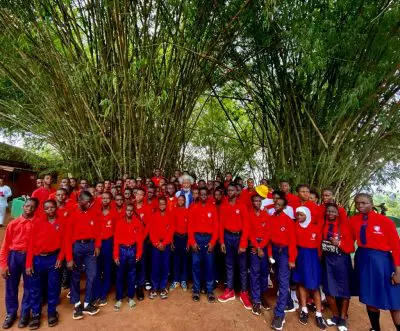
That was the moment I made up my mind to, somehow, get the Kongi to come down to human level of sport, and to, hopefully, start to see and appreciate the sector and how important it is in my own humble estimation.
Sport can be a contributor to scholarship and the building process of a new Nigeria. Sport needs his voice to strengthen our resolve to see it become a priority area of governments, an important ingredient and critical tool for national integration, unity, our humanity, urban development, health, international diplomacy, the environment, youth engagement, education, job creation, economic contribution, infrastructural development, and empowerment of the youth. Nelson Mandela, another global figure, could not have been flippant when he once said: ‘Sport has the power to change the world’.
I needed to get the ‘greatest’ scholar and teacher to pay a visit to the model sports and education academy I had established, to see it, and to meet with the little boys and girls in the laboratory of learning and of instruction. The evidences of the success of SOCA are around the campus of the institution where sports and academics have been successfully co-habiting for 14 years, and producing phenomenal and measurable results and products.
I wrote and invited Professor WS to SOCA, the Segun Odegbami International College and Sports Academy. He knew who I was, of course, but nothing about the school. He must have assumed, like most Nigerians do, that it is an institution where children wasted their youthful years playing football, with a handful of them succeeding to berth in top professional clubs in Europe, and the vast majority failing to accomplish much except to add to the ugly statistics of a sector that is littered with painful stories of eventual idleness, joblessness, penury, neglect disregard, and the suffering of neglected sports heroes.
Also Read – Odegbami: The Rise And Rise Of the Power Of Athletes!
No, no, no, things are not that gloomy and dire. There is a bright and untapped world out there, an economically booming world that can accommodate and flourish the lives of a sea of young boys and girls gifted in sports, but combining it with proper education.
Prof. responded to my invitation and promised to find some time away from his global talking and teaching engagements to visit the academy. That was some 3 or 4 years ago.
Then the pandemic struck. Through Tunde Kelani, I had the opportunity to remind him again personally. This time he made a firm commitment to come and see for himself the paradise I told him I was creating.
Last Thursday, a special day selected by him for its significance, he fulfilled his promise and came to share the United Nations International Children’s Day with the lucky students and staff of the Segun Odegbami International College and Spirts Academy, SOCA. Parents and a few friends were present to witness the uncommon meeting held on the green lush, immacutely landed sports grounds within the campus in Wasimi Orile.
What a day it turned out to be, worth all the years it took to wait for ut to happen. It was an extraordinary experience for the students in particular, and just as I had expected, also for Professor Wole Soyinka.
Tunde Kelani, a ‘minister’ in the Autonomous Republic of Ijegba, a student and disciple of the sage, swore he had not seen the reverred Professor as relaxed, happy and completely at home as he saw him in the serenity of Wasimi. Prof. fell in love instantly with the environment and atmosphere of the school.
It was a very simple and uncomplicated event. The 3 short hours he spent on the campus was a breeze.
He was welcomed by the staff of the school, and taken on a quick tour of the academic facilities (library, IT centre, classrooms, dormitory and laboratories). To walk an 85-year old man around a sprawling 22-acre campus to see its sports facilities was unnecessary and would have been most unkind. As, I pointed out those to him from a distance.
Then he met with the student-athletes, under a canopy in the manicured grounds. He listened to one of them, a 16-year old boy, deliver what was a masterful welcome speech, mostly extempore. Prof described the young lad as a future great orator. He as very impressed.
He watched a cultural performance and a small drama sketch put up by the students, for which he had commendation as a well as useful criticism.
As the students retired to their dormitories, the staff, parents and some invited friends also ‘retired’ to the Rufus Orisayomi Bamboo Grove for the traditional Wasimi Orile hospitality, a feast of the freshest palm wine certified by Kongi himself as vintage Amos Tutuola, author of ‘the Palmwine Drinkard’, plus asun grilled meat from young lamb reared in the rolling wooded hills of Wasimi.
At the end if it all, in his closing remarks on his experience, Kongi had this to say: “I am glad that I finally came to see this school and appreciate what’s going on here. I have thoroughly enjoyed my stay here, and assure you that I shall come again”.
My mission was accomplished. I got Professor Wole Soyinka to make his first visitation to a sports institution and secured his endorsement that Sports and Academics can co-habit successfully in empowering the youths and advancing the cause of humanity.
In recalling that experience permit me to quote an English Language adage coined by Henrik Ibsen: ‘A picture is worth a thousand words’.
The attached picture of Kongi, with the students of SOCA surrounding him, celebrating the unique experience of this most private of visitations by the great Nobel Laureate, in his full and unguarded element, speaks more than a thousand words.



